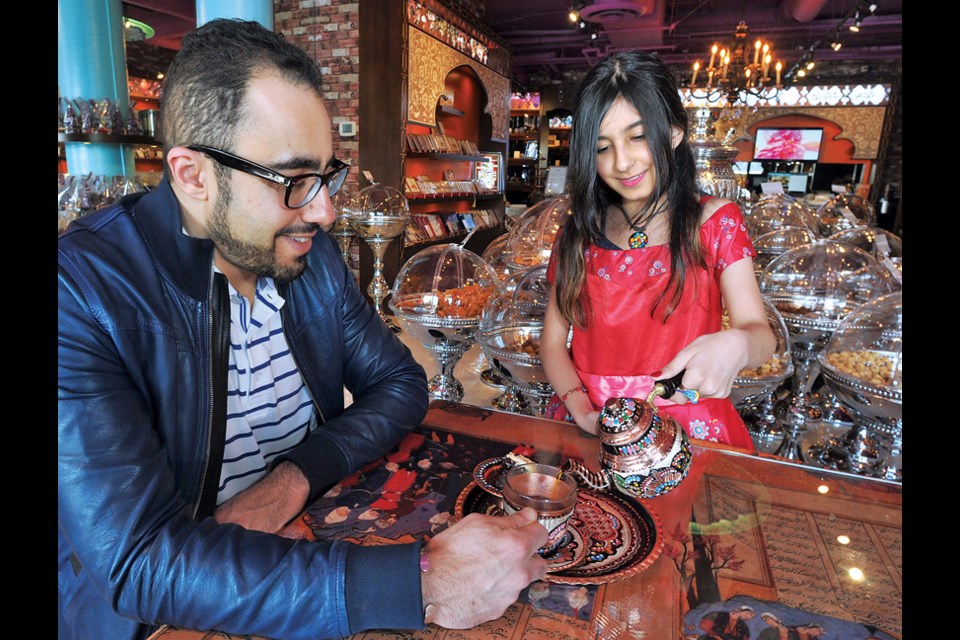Saffron Palace furnishes a very particular kind of luxury experience. It is one rooted in traditions that are not my own, but for which I have developed a tremendous respect and fascination.
I sat sipping a potent Turkish coffee from an elegant service inside the shop one recent afternoon. As I sat, my head began to swim, my eyes entranced by the intricate geometric designs that dominate the space, bold and fine lines intersecting at angles of increasing complexity, shapes melding into one another with mind-bending illusion, colours interplaying with subtle gradations; the mathematics of the esthetic were dizzying.
As my brain tried to keep up with the visual stimulus, the lyrical, rolling lilt of Farsi filled my ears, the staff of the shop discussing matters that may well have been mundane but to me sounded of vital importance. Meanwhile, my palate tried to reconcile the impossibly fragrant flavours bursting from the pomegranate and pistachio Turkish Delight that accompanied my coffee, the two squares of the confection dusted in fine sugar packing a wallop of taste disproportionate to their diminutive size, while scents of rosewater, toasted nuts, saffron, citrus, and sticky, caramelized figs and dates hypnotized my nostrils, conjuring scenes of bazaars and heat-shrouded, rolling hills that I have seen only in the images of popular culture, but never in person.
Saffron Palace specializes in confections and delicacies from the Middle East, with an emphasis on Persian specialties, including exceedingly good dried figs from the arts and culture rich region of Shiraz, Iran. Placards next to every item in the shop identify the origins of the wares and include Iran, Dubai, Turkey, and Afghanistan. The center of the shop is dedicated to floor-standing displays of bulk items like roasted pistachios and cashews prepared in various styles (lemon and saffron, black pepper, jalapeno, etc.), desiccated fruit blends, dried mulberries (the curious regional fruit that is sort of like a heavily textured raisin but with a pulpier, less acidic profile) and, for my money, the most interesting new food item I have tried in a long while, wild pine nuts from Afghanistan.
I love pine nuts; I find them deliciously rich and exotic in flavour, at once perfumed and buttery, challenging and enticing. I have been known to roast a handful and enjoy them as a snack with Belgian saison or Austrian gruner veltliner, both fragrant and acidic enough to pair well with the feisty little nuts, which are, properly speaking, seeds. The Afghan variety of the pine nut, sold here in the shell, are longer and narrower in shape and resemble swollen grains of wild rice. The black-ish tubes are easily cracked in half with a firm bite of the incisors, revealing the edible seed within. The oils of the seed are retained when they are eaten this way, giving a much more explosive, notably pine-like taste followed by the more familiar velvety, rounded character of the varieties commonly available on our markets. I recommend a trip to the shop just to try out these peculiar, addictive treats.
My Turkish coffee was prepared in traditional fashion, in an ornate, specialty pot with a long handle, to be heated over sand on what looks like a Spanish plancha, then strained into an equally ornate cup with a lid. Turkish coffee paraphernalia is sold in Saffron Palace in various designs. The coffee is presented with a side of Turkish Delight, as described above; boxes of the confection are also available for purchase in different flavours and cost around $35.
I enjoyed a bag of lemon and saffron pistachios at home, the fresh nuts lifted with a subtle hint of their flavouring, but not so much as to detract from the innately delicious taste of the nuts themselves.
The shop also specializes in another famous delicacy, albeit one that exceeds my budget by a substantial margin and, if I’m being honest, doesn’t really fit with my ethos on dining. Nevertheless, those inclined to pursue the truly extravagant can find a few varieties of Caspian Sea Caviar for sale at Saffron Palace, with Beluga from the Iranian side of the waters – a truly rare luxury indeed – available year round. The price tags are what you might expect from this quintessentially indulgent item, which as far as I can deduce still has not been fully restored to “eat at will” status according to international sturgeon conservation authorities, but has been granted limited sales license thought to be sustainable in the long-term restoration of the fish population. I recall eating Beluga caviar once in the early 1990s and finding it extraordinarily delicate and ethereal, but have since only ever had experience with our locally farmed Northern Divine product. The Ocean Wise website, seafood.ocean.org, has a good interactive tool to review recommended and discouraged seafoods available on our market.
I am of the mind that Saffron Palace is a great spot for elegantly packaged, specialty gifts from the Middle East, including eye-catching ceramics, and is definitely worth visiting for a Turkish Coffee (with a delicious side of Turkish Delight) in an impressively designed space.
Saffron Palace, 1471 Bellevue Avenue, West Vancouver. Saffronpalace.com. 778-819-7070.



